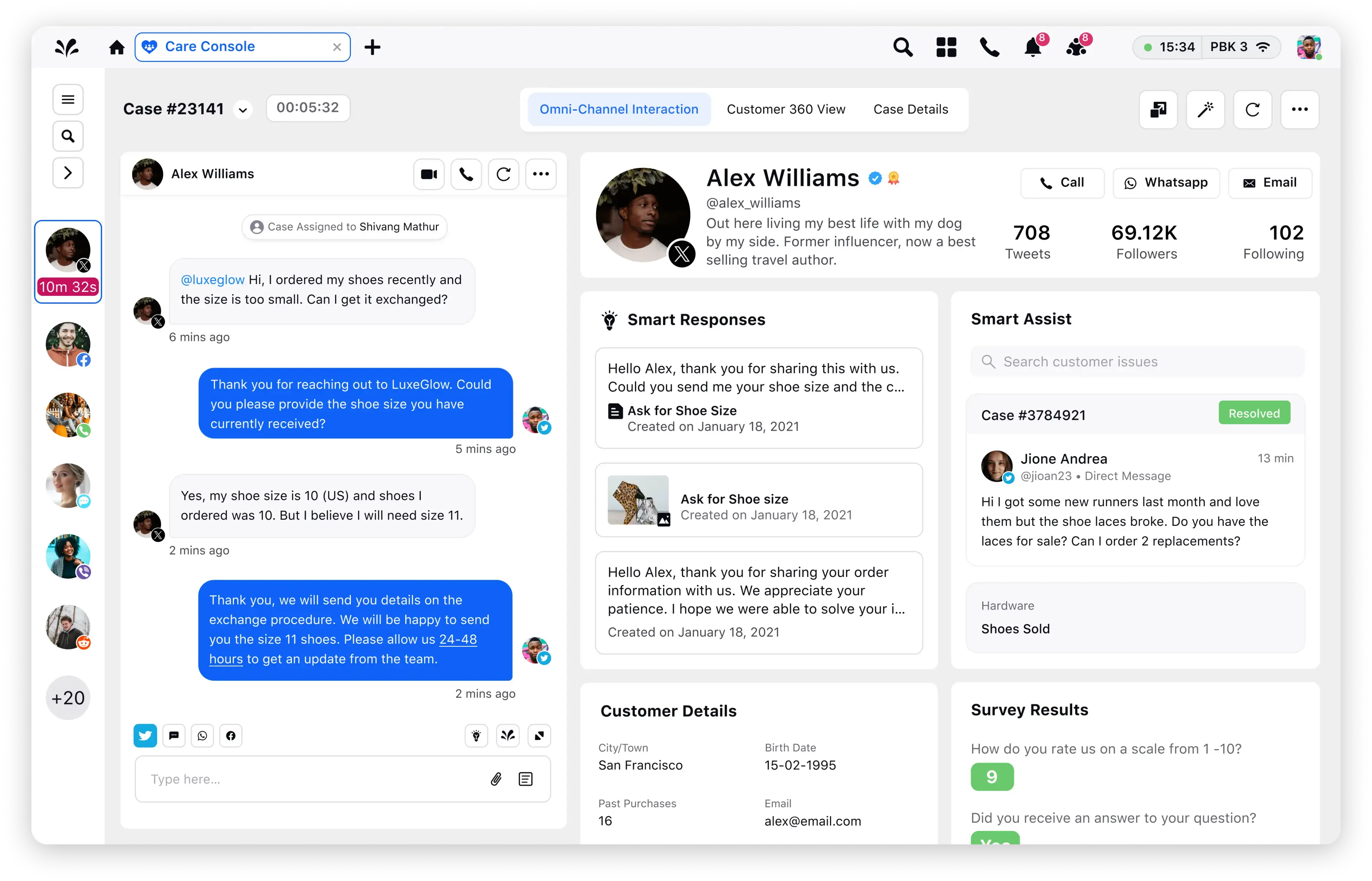The next generation of CCaaS is here
Digital-first customer service, enterprise-scale voice support. Redefine customer service with an AI-powered platform that unifies voice, digital and social channels. Power channel-less interactions and seamless resolution no matter the channel of contact.

Contact Center Compliance: Importance, Strategy & Checklist
In an era marked by the widespread use of online communication and the proliferation of digital channels, contact centers grapple with an incessant influx of customer data and sensitive information.
Safeguarding this wealth of information from unauthorized access, data breaches, tampering and theft has become paramount. That’s where contact center compliance enters the picture. It entails adopting a comprehensive approach towards responsible collection, storage and handling of customer data.
The repercussions of failing to adhere to regional and international regulatory standards are significant, encompassing prolonged legal battles, hefty penalties and damage to your company's reputation.
However, in an era where regulatory guidelines and security standards evolve almost annually, maintaining contact center compliance is both a strategic imperative and a formidable challenge.
In this blog, delve into the nitty-gritty of contact center compliance, explore the challenges it presents and obtain a comprehensive checklist of essential compliances to prioritize.
What is contact center compliance?
Contact center compliance embodies the unwavering commitment to aligning operations with the stringent regulations established by either governing bodies or the internal policies of an organization. It represents the state of consistently adhering to applicable laws and industry standards, ensuring the ethical and lawful conduct of contact center operations.
However, the nature of these regulations may vary based on geographical location, industry or organizational structure. That’s precisely what makes contact center compliance tricky and sometimes complicated.
Moreover, the advent of cloud contact centers and CCaaS has heightened the risk of data loss and privacy breaches, intensifying the importance of robust contact center compliance. Navigating these complexities becomes even more critical in an environment where evolving technologies intersect with regulatory frameworks.
Why is contact center compliance important?
Aligning with federal and provincial regulations often provides a competitive edge, allowing unrestricted access to various marketplaces. This legal compliance facilitates the broad distribution of your products and services and instills a heightened level of consumer trust. In addition, there are a couple of other reasons that make contact center compliance significant, irrespective of the industry you are operating in.
- Financial consequences: Non-compliance exposes you to penalties, substantial fines and legal actions, placing a significant financial burden on your business.
- Customer relations strain: Inadequate compliance adversely affects customer satisfaction, leading to increased complaints, client escalations, and strained relationships with the customer base.
- Deterioration of trust and loyalty: The loss of customer trust is a profound consequence, directly impacting customer loyalty and potentially causing long-term damage to your brand reputation management efforts.
- Operational disruptions: Contact center operations are significantly disrupted, affecting the efficiency and effectiveness of customer service.
- Poor employee productivity: The consequences extend internally, impacting employee morale and engagement, which can have cascading effects on productivity and employee advocacy.
A step-by-step checklist for contact center compliance
Adapting compliance measures to industry-specific nuances, organizational structures and varying geographical regulations can be challenging. Additionally, integrating new technologies, like contact center AI, requires careful consideration to balance innovation with regulatory adherence.
Keeping that in mind, here is a 9-step contact center compliance checklist you must keep handy.
Step 1: Do you understand pertinent compliance regulations?
With increased globalization, if not all, you must be aware of major contact center compliance mandates. Depending on your industry, make sure to follow the specific compliance mandates that apply to you.
Compliance Act | Description | Industry |
Telephone Consumer Protection Act (TCPA) | Regulates telemarketing calls, text messages and unsolicited faxes to protect consumers from unwanted communications. | Telemarketing, financial services, healthcare |
Health Insurance Portability and Accountability Act (HIPAA) | Ensures the security and privacy of individuals' health information in the healthcare industry. | Healthcare |
General Data Protection Regulation (GDPR) | European regulation governing the processing of personal data, emphasizes transparency and user consent. | Multinational companies, e-commerce, technology |
Payment Card Industry Data Security Standard (PCI DSS) | Enforces security standards for organizations handling credit card transactions to prevent data breaches. | Retail, financial services |
Fair Debt Collection Practices Act (FDCPA) | Regulates third-party debt collectors, prohibiting abusive practices and ensuring fair treatment of consumers in debt collection processes. | Financial services, debt collection |
Telemarketing Sales Rule (TSR) | Governs telemarketing practices in the United States, outlining rules for contacting consumers and prohibiting deceptive practices. | Healthcare, retail, education, |
Sarbanes-Oxley Act (SOX) | Focuses on financial and accounting practices, ensuring accuracy and transparency in corporate disclosures to protect investors and shareholders. | All publicly traded companies in the USA |
CAN-SPAM Act | Regulates commercial email messages, requiring clear opt-out mechanisms and accurate sender information to prevent spam. | Marketing, e-commerce, online services |
Federal Trade Commission Act (FTC Act) | Empowers the Federal Trade Commission to prevent unfair and deceptive business practices, including those related to contact center activities. | Consumer goods and services, technology, online services, healthcare, telecommunication, energy and more. |
California Consumer Privacy Act (CCPA) | Provides California residents with privacy rights, allowing them to control their personal information and imposing obligations on businesses handling their data. | A state statute intended to enhance privacy rights and consumer protection for residents of the state of California in the United States. |
Step 2: Do you monitor and report key contact center incidents?
Establish a robust incident monitoring and reporting system to detect and report any security incidents promptly.
Robust reporting systems provide:
- Real-time insights into agent activities, allowing supervisors to monitor agent adherence to established compliance policies
- A comprehensive audit trail documenting every interaction and transaction
- Aids in evaluating agent performance metrics
- Real-time alerts and notifications when certain predefined thresholds or anomalies are detected, allowing for prompt intervention and mitigation
Good to know: Modern agent console offers AI-driven smart response compliance to check if your brand response meets established standards, including brand guidelines, non-profanity, relevance, semantics, tone and unbiasedness. If your response falls into any of these six categories, it will raise a red flag.
Step 3: Do you respect do-not-call (DNC) lists?
DNC lists protect the privacy preferences of individuals who do not wish to be contacted for marketing purposes. Respecting DNC lists is a primary aspect of staying compliant and demonstrates a commitment to customer privacy, fostering trust and positive customer relationships. It helps avoid potential backlash and negative publicity associated with unwanted calls.

Step 4: Do you authenticate customers in every inbound call?
Introduce caller ID systems to provide agents with precise caller details. By seamlessly integrating contact center CRM, customer information will be effortlessly retrieved upon incoming calls, ensuring agents have immediate access to essential details at their fingertips.
Do you know: The modern agent console not only fetches customer information before a call but also utilizes AI to assist agents in real time. Agents can seamlessly switch channels, maintaining context and accessing historical conversations, ultimately reducing the average handle time by 30%.
Step 5: Do you ensure customer consent and opt-in before communication?
Ensuring compliance begins with obtaining explicit consent or customer opt-in before making any calls. Maintaining meticulous records of these permissions is essential, keeping track of who has agreed to receive calls.
Step 6: Do you record and document every conversation?
Transparently informing callers about call recording for quality monitoring and training is pivotal for compliance. Storing these recordings and associated data securely aligns with data retention policies and safeguards sensitive information. Additionally, understanding the distinction between two-party and one-party consent states is crucial to ensure compliance with the varying legal requirements across different regions or states.
Robust documentation of these recordings and related data adds a layer of protection and serves as valuable evidence in case of any disputes or compliance audits.
Step 7: Do your agents adhere to pre-defined call scripts?
Crafting call scripts and playbooks that strictly adhere to compliance regulations is vital. Avoiding language that could potentially mislead or deceive customers ensures compliance with regulations and ethical practices. Regularly reviewing and updating these scripts is essential to stay aligned with evolving regulations, safeguarding against any unintentional violations and ensuring ongoing adherence to best practices.
Deep dive: Call management: A comprehensive guide
Step 8: Do you monitor quality performance regularly?
Regular scrutiny ensures adherence to regulatory requirements and internal company policies is critical. Feedback and coaching are equally crucial, as they empower your agents with insights derived from quality assurance evaluations, fostering continuous improvement and maintaining a high standard of compliance in customer interactions. This iterative process contributes to your contact center's adaptive and responsive compliance framework.
Good to know: Modern quality management software helps you track and score 100% of your daily conversations on 30+ quality and compliance parameters such as opening/closing quality, intro, active listening, empathy and more. Rate agent performance with automated scoring and identify strengths and areas of improvement for each individual agent.
Learn more: A Complete Guide to Contact Center Quality Management
Step 9: Do you have a structured compliance training and coaching program?
Make compliance training mandatory for newly hired contact center agents during onboarding, and it must emphasize how agents should adeptly manage customer interactions and handle sensitive customer information, fostering a culture of responsibility and accountability.
Moreover, designate specific team members for regular compliance monitoring and coaching and build guided workflows with integrated compliance for new agents to start using without any learning curve.
Editor’s pick: 10 customer service coaching tips to supercharge your support teams
How to avoid pitfalls in contact center compliance
Whether you run an inbound contact center or outbound call center, adhering to the best practices is instrumental in safeguarding your business against the detrimental consequences associated with non-compliance. Take a look at the contact center compliance best practices you should be aware of.
- Conduct compliance audits and establish clear policies
Utilize an audit checklist and thoroughly audit existing processes, identifying potential compliance gaps and understanding the specific regulatory requirements applicable to your industry and region.
Develop and document clear policies outlining how your contact center will comply with relevant regulations. Ensure these policies are accessible to all employees and regularly updated to reflect regulation changes. - Implement robust security measures
Strengthen data security by implementing encryption, access controls and other measures to safeguard sensitive customer information. Regularly update security protocols to stay ahead of emerging threats.
You should also perform physical workstation audits to inspect a remote employee's work environment and ensure it supports basic controls and meets compliance requirements. To overcome the challenge of remote workstation visits, ensure your supervisors use video conferencing to perform high-level audits.
2 pillars of data security in the age of Generative AI and data scraping
- Data masking: It involves disguising sensitive information, rendering it useless for unauthorized users even if accessed. This protects against the misuse of data generated by AI models.
- Data validation: It ensures the accuracy and integrity of the information, thwarting potential manipulations by automated scraping tools.
Why does it matter? In March 2023, ChatGPT, a popular generative AI chatbot, experienced a data breach that exposed premium subscribers' conversation histories and payment details. The breach was caused by a vulnerability in the Redis cache that ChatGPT used to store user information. As a result of the breach, the conversation histories and payment details of approximately 100,000 ChatGPT users were leaked onto the internet.
How to tackle it? In the era of widespread Gen AI adoption in customer support, harness the capabilities of Sprinklr AI+ to automate compliance tasks, fortify risk mitigation, and safeguard sensitive information—all while maintaining seamless customer support. With Sprinklr AI+, stringent security measures are guaranteed, ensuring a robust defense, regardless of the Gen AI models in use. - Spread awareness among customers
The frequency of online fraud and authentication attacks has seen substantial growth in recent years. Notably, attackers are shifting their focus toward end customers rather than direct assaults on companies.
Educate customers about the policies and practices you follow for collecting customer data over digital mediums with a key focus on the methods you don't use. IVR calls, SMS and WhatsApp are the most effective channels to spread awareness to a broader audience.
Your brand website is also a great customer touchpoint to spread awareness about your security and trust policies. Sprinklr, for example, publishes its certifications and acceptable use policy documents on its trust center so they are accessible and transparent. - Utilize call center technology
Call center technology is pivotal in safeguarding sensitive information and ensuring compliance. Advanced redaction software automates the identification and deletion of personally identifiable information and sensitive data when customers fill out contact forms. - Regularly update systems and software
Keep your technology infrastructure up to date to address potential vulnerabilities. Regularly update software, firmware and security patches to ensure optimal protection against evolving cyber threats. - Partner with compliance experts
Collaborate with legal and compliance experts to stay informed about the latest regulatory changes. Leverage their insights to enhance your compliance strategy continuously. - Develop a contingency plan
Prepare for unforeseen circumstances by developing a contingency plan. Outline clear steps to follow in case of a service level agreement (SLA) breach, downtime and more, ensuring swift and organized crisis communication. - Leverage automation for compliance monitoring
Embrace cloud contact center solutions with built-in compliance monitoring and reporting functionalities. Also, by employing customer service automation, you can enhance accuracy, reduce human error and provide real-time insights into your compliance status and customer service standards.
Simplify contact center compliance with Sprinklr Service
In the ever-evolving customer experience landscape, contact center compliance is a critical pillar. The challenges CX leaders often face range from the intricacies of data security to the complexities of regulatory adherence, which underscore the necessity for a robust compliance strategy.
Also, it's not just about avoiding penalties; it's about safeguarding customer trust and loyalty, isn't it?
That's where a unified quality management solution like Sprinklr can make a difference — Not just meet but exceed compliance standards. Here’s how Sprinklr’s customers keep their contact centers compliant and ensure the security and privacy of customers' data:
- Platform security features: Safeguard customer information through comprehensive security standards, covering web applications, optimized infrastructure and governance across all digital channels.
- Product security functionalities: Enhance protection with enterprise-grade security features like role-based access permissions, single sign-on, two-factor authentication, IP-restricted access and more.
- Network security measures: Monitor network activity using firewalls, cloud security posture management and routine network penetration tests to detect anomalies and respond to security events promptly.
- Detection and response management: Address security instances promptly with threat detection engineering, vulnerability management, incident response and crisis communication management.
- Compliance training: Strengthen your defense by providing ongoing compliance training to employees, ensuring they are well-versed in the latest security protocols and best practices.
Take a 30-day Free Trial today, or schedule a demo with our experts!
Frequently Asked Questions
Non-compliance can lead to legal actions, hefty fines and damage to your contact center's reputation. Penalties vary based on the nature and severity of the violation.
Implementing AI enhances accuracy in monitoring, ensures real-time compliance insights, and aids in identifying and addressing potential issues promptly. It streamlines processes, reducing the risk of violations.
Regular reviews are essential; however, the frequency depends on regulatory changes and industry dynamics. Generally, annual reviews are recommended, with more frequent updates if there are significant regulatory shifts.



